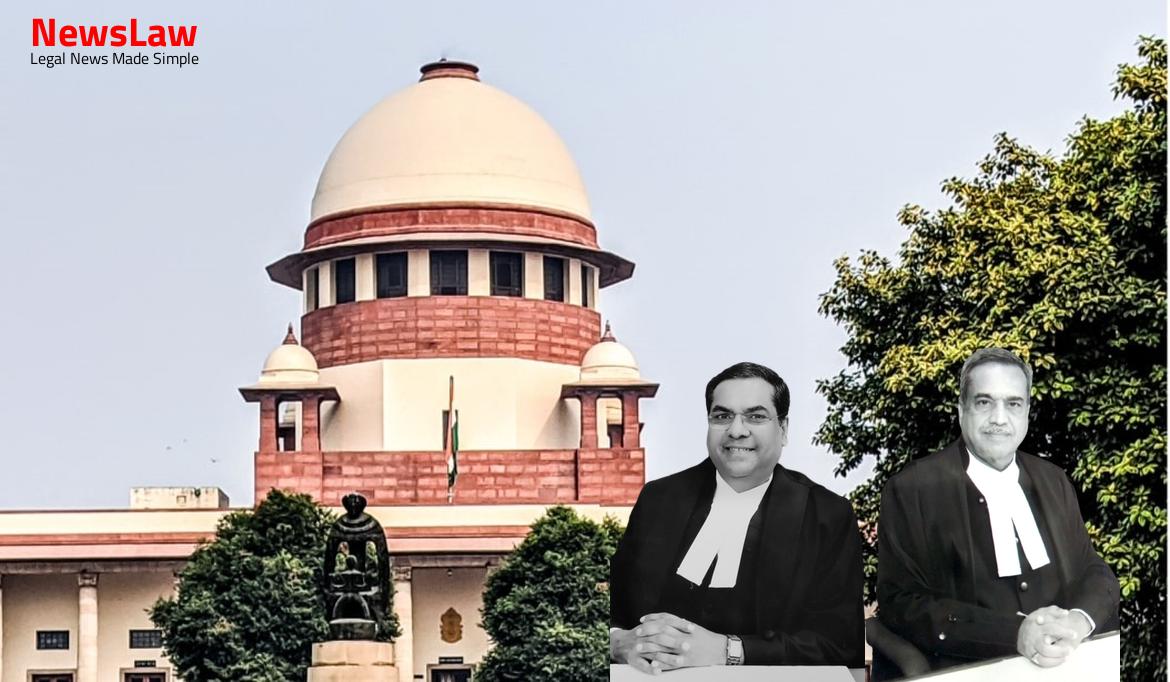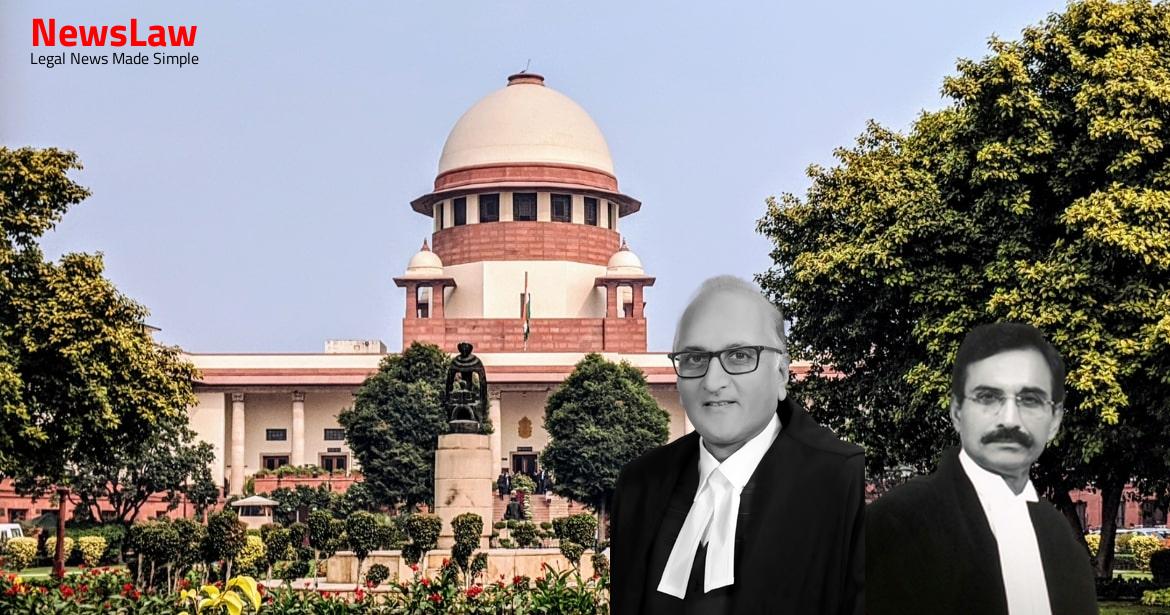Delve into the intricate legal analysis conducted by the court in a partition suit case regarding the application of res judicata. The court’s examination of previous judgments, the principle of res judicata, and its implications on subsequent legal actions provide valuable insights into the complexities of legal proceedings.
Facts
- The first respondent filed a suit for partition and possession, challenging the validity of a sale deed and claiming his share in the property.
- The Trial Court decreed the suit, directing the defendants to hand over possession to the plaintiff.
- The Trial Court noted that challenges regarding auction and sale deed validity should be addressed independently.
- The first respondent and his brother inherited the property from their mother.
- The third defendant took a loan from KSFC and mortgaged the property as security.
- The issue of whether the suit is barred by res judicata should be decided in the suit and not in an application.
- The third respondent filed an application for staying the suit proceedings till the disposal of an appeal, citing similar issues.
- The High Court invoked revisional jurisdiction to challenge a previous order.
- The first respondent did not consent to the mortgage of the property and received knowledge of the sale deed during the suit proceedings.
- The appellant filed a revision petition against a Trial Court order.
- The validity of the sale deed was noted as a separate issue to be determined in another suit.
- The first respondent’s written statement in another suit raised defenses against KSFC’s authority to sell the property.
- The first respondent was also a party in a 2004 suit for partition and separate possession of the property.
- The application under Order 7 Rule 11 was dismissed by the Trial Judge on 1 July 2019 for specific reasons.
- The court fee issue did not lead to rejection as the required order was not passed by the court.
- The cause of action was adequately pleaded by the first respondent in the plaint.
- To reject a plaint based on being barred by any law, the court should refer to the averments in the plaint and not the defense.
- The High Court upheld the Trial Court’s decision based on these grounds.
- The suit being barred by res judicata due to issues raised in a previous suit was contended by the appellant.
- The High Court upheld the earlier decree based on the third respondent’s entitlement as a bona fide auction purchaser.
- Subsequently, the appellant filed an application under Order 7 Rule 11 for rejection of the plaint.
Also Read: Electoral Malpractices in Mayor Election
Arguments
- The appellant challenged the High Court’s order regarding the rejection of the application under Order 7 Rule 11 of the CPC.
- The case in question, O.S. No 138 of 2008, involved a suit for declaration, partition, possession, and injunction.
- The High Court relied on the decision in Soumitra Kumar Sen v. Shyamal Kumar Sen for the principle of res judicata.
- The High Court held that a plea of res judicata cannot be decided solely based on the plaint averments.
- The first respondent in the case filed the suit (O.S. No 138 of 2008) to assert his claim as a lawful owner in the suit property.
- The appellant argued that the title of the suit property had already been adjudicated in favor of their predecessor-in-interest in an earlier suit.
- The appellant contended that another suit with the same issues and challenges to the sale deed was not maintainable and barred by res judicata.
- The first respondent was previously named as the second defendant in an earlier suit.
- The first respondent raised a defense regarding the validity of the sale by KSFC to the third respondent.
Also Read: Balancing Power and Transparency: Electoral Bonds Struck Down, Disclosure Mandated
Analysis
- The court must consider only the statements in the plaint when determining if the suit is barred by any law.
- For res judicata to apply, the same issue raised in the current suit must have been adjudicated in a previous suit.
- The first respondent in the case was aware of the earlier suit but still filed a subsequent suit challenging the legality of the sale deed.
- The issues raised in the earlier suit had not been adjudicated upon when the subsequent suit was filed.
- It is important to consider the court’s approach to res judicata before using it as a ground for rejecting the plaint under Order 7 Rule 11.
- Before referring to precedents on the interpretation of Order 7 Rule 11(d) CPC, it is essential to consider Section 11 of the CPC which defines res judicata.
- Section 11 of the CPC establishes the rule of res judicata, stating that a court cannot try any suit or issue in which the matter directly in question has been previously heard and decided in a former suit.
- In the case of Shakti Bhog Food Industries Ltd. v. Central Bank of India and Another, a three Judge bench of the Court dealt with the rejection of a plaint under Order 7 Rule 11 on the ground of limitation.
- The Court held that resorting to Order 7 Rule 11 was not appropriate for the appellant, and suggested that after framing the issues, the Trial Court may decide on the maintainability issues first to avoid lengthy proceedings.
- In Soumitra Kumar Sen, an application under Order 7 Rule 11 claiming rejection of the plaint on the ground of res judicata was dismissed by the Trial Judge and also affirmed by the High Court.
- The guiding principles for deciding an application under Order 7 Rule 11(d) were summarized from previous authorities, emphasizing that to reject a plaint based on any law, only the averments in the plaint should be considered, and the defense made by the defendant should not influence the decision on the application.
- The principles also highlighted the requirements to determine if a suit is barred by res judicata, emphasizing the need for direct and substantial issues between the current and former suits with the same parties or those litigating under the same title.
- Adjudication of the plea of res judicata extends beyond the scope of Order 7 Rule 11(d) as it requires consideration of the pleadings, issues, and decisions in the previous suit, making it unsuitable for a summary judgment under Order 7 Rule 11(d).
- The Court examined the ambit of Order 7 Rule 11(d) of the CPC.
- The view taken in the case has been consistently followed in a line of decisions of the Court.
- Justice P Sathasivam, in another case, reiterated the above view.
- An application under Order 7 Rule 11 must be decided within the four corners of the plaint.
- The court has expressed no opinion on whether the subsequent suit is barred by the principles of res judicata.
- The appellant, claiming as an assignee of the bona fide purchaser of the suit property, is granted liberty to raise an issue on the maintainability of the suit in another court.
- The High Court and the Trial Court were correct in holding that to decide on the arguments raised by the appellant, the court would have to go beyond the averments in the plaint and peruse the pleadings, judgment, and decree in the previous suit.
- The plaint was not liable to be rejected under Order 7 Rule 11(d) and the findings of the Trial Court and the High Court are affirmed.
- On the face of it, the plaint does not disclose any fact that may lead to the conclusion that it deserves to be rejected on the ground that it is barred by principles of res judicata.
Also Read: Recall of Resolution Plan Approval: Legal Analysis
Decision
- Additional Civil Judge, Belgaum to consider framing a preliminary issue under Order XIV
- Decision on preliminary issue to be made within 3 months of raising the issue
- Trial court and High Court were correct in rejecting application under Order 7 Rule 11(d)
- Application under Order 7 Rule 11 of CPC to be dismissed
- Suit to be finally adjudicated by 31 March 2022
- Appeal dismissed, High Court judgement affirmed
- No costs to be awarded
- Pending applications disposed of
Case Title: SRIHARI HANUMANDAS TOTALA Vs. HEMANT VITHAL KAMAT (2021 INSC 387)
Case Number: C.A. No.-004665-004665 / 2021



